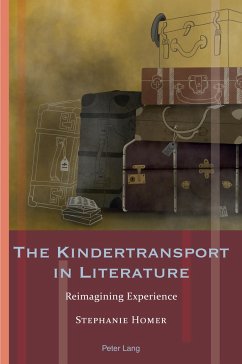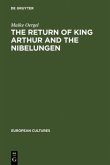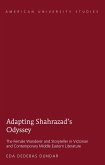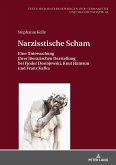«In this insightful book, Stephanie Homer interrogates how different genre conventions (memoir, autobiographical fiction and novels) influence the representation of the Kindertransport. Her theoretical approach is sophisticated, her selection of texts judicious and representative. Homer's contribution to the study of the reception history of the Kindertransport is important and timely.» (Bill Niven, Professor of Contemporary German History, Nottingham Trent University)
«An immensely valuable intervention into studies of Kindertransport representations, this book invites readers into the ambiguities of memory. With clarity and confidence, the book explores the liberating creative potential of autobiographical fiction and polyphonic fictional voices which have reimagined the places and perspectives on Kindertransport as a migratory experience and literary compulsion. The book makes an important contribution to our understanding of Kindertransport literature as a genuinely transnational genre of witnessing and re-witnessing.» (Dr Simone Gigliotti, Senior Lecturer in Holocaust Studies, Royal Holloway, University of London)
With the dwindling number of Kindertransportees alive today, the living memory of this rescue operation is being transformed into cultural memory, a trend noticeable in the publication of popular Kindertransport fiction since the beginning of the twenty-first century. This change in memory invites the following questions: how is the child refugee's experience remembered, represented and reimagined in literature? And, consequently, what understanding of the Kindertransport is being transmitted to the following generations?
Drawing on understandings of genre, narratology and empathy, this book examines works in English, German and Dutch from three literary genres: memoirs and autobiographical fiction by Kindertransportees and recent fiction by authors with no first-hand experience of the Kindertransport. This study exposes the various conventions, tensions and reader expectations attached to each genre and how these influence the author's construction of the text and, in turn, the nature of the representation. This topical research engages in debates at the heart of current discussions on Holocaust and Kindertransport memory, such as the limits of representability, the «unspeakability» of trauma, and issues of ethics and aesthetics.
«An immensely valuable intervention into studies of Kindertransport representations, this book invites readers into the ambiguities of memory. With clarity and confidence, the book explores the liberating creative potential of autobiographical fiction and polyphonic fictional voices which have reimagined the places and perspectives on Kindertransport as a migratory experience and literary compulsion. The book makes an important contribution to our understanding of Kindertransport literature as a genuinely transnational genre of witnessing and re-witnessing.» (Dr Simone Gigliotti, Senior Lecturer in Holocaust Studies, Royal Holloway, University of London)
With the dwindling number of Kindertransportees alive today, the living memory of this rescue operation is being transformed into cultural memory, a trend noticeable in the publication of popular Kindertransport fiction since the beginning of the twenty-first century. This change in memory invites the following questions: how is the child refugee's experience remembered, represented and reimagined in literature? And, consequently, what understanding of the Kindertransport is being transmitted to the following generations?
Drawing on understandings of genre, narratology and empathy, this book examines works in English, German and Dutch from three literary genres: memoirs and autobiographical fiction by Kindertransportees and recent fiction by authors with no first-hand experience of the Kindertransport. This study exposes the various conventions, tensions and reader expectations attached to each genre and how these influence the author's construction of the text and, in turn, the nature of the representation. This topical research engages in debates at the heart of current discussions on Holocaust and Kindertransport memory, such as the limits of representability, the «unspeakability» of trauma, and issues of ethics and aesthetics.
«In this insightful book, Stephanie Homer interrogates how different genre conventions (memoir, autobiographical fiction and novels) influence the representation of the Kindertransport. Her theoretical approach is sophisticated, her selection of texts judicious and representative. Homer's contribution to the study of the reception history of the Kindertransport is important and timely.» (Bill Niven, Professor of Contemporary German History, Nottingham Trent University)
«An immensely valuable intervention into studies of Kindertransport representations, this book invites readers into the ambiguities of memory. With clarity and confidence, the book explores the liberating creative potential of autobiographical fiction and polyphonic fictional voices which have reimagined the places and perspectives on Kindertransport as a migratory experience and literary compulsion. The book makes an important contribution to our understanding of Kindertransport literature as a genuinely transnational genre of witnessing and re-witnessing.» (Dr Simone Gigliotti, Senior Lecturer in Holocaust Studies, Royal Holloway, University of London)
«An immensely valuable intervention into studies of Kindertransport representations, this book invites readers into the ambiguities of memory. With clarity and confidence, the book explores the liberating creative potential of autobiographical fiction and polyphonic fictional voices which have reimagined the places and perspectives on Kindertransport as a migratory experience and literary compulsion. The book makes an important contribution to our understanding of Kindertransport literature as a genuinely transnational genre of witnessing and re-witnessing.» (Dr Simone Gigliotti, Senior Lecturer in Holocaust Studies, Royal Holloway, University of London)








